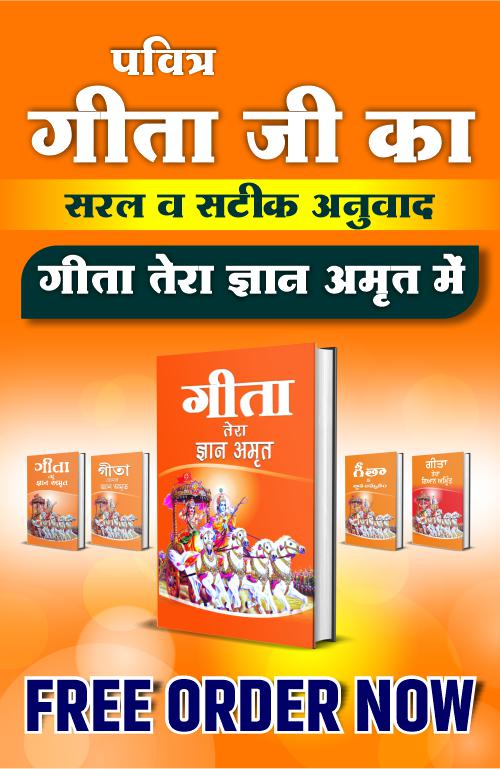
Question: - The way of worship that we are already practising, will we have to relinquish it?
Answer: If the current way of worship is against the injunctions of the scriptures, then you will have to relinquish it. If you have taken initiation from an unauthorised person, then it is useless. You will have to take initiation of worship from a complete guru.
Question: - In Gita Chapter 18 Verse 47 and Gita Chapter 3 Verse 35, it is stated: -
Shreyan swadharmH vigunH pardharmaat swanushthitaat |
Swadharme nidhnam shreyH pardharmH bhayaavahH || (Gita Chapter 3 Verse 35)
Compared to other’s religion which is well-practised, one’s own religion is better even if it is meritless. It is even beneficial to die in one’s religion, and the other’s religion is frightening.
Answer: - This translation is wrong. If this statement is true that one should not relinquish one’s religion even if it is meritless, then what was the need of writing the knowledge of Shrimad Bhagavad Gita in 700 Verses of 18 Chapters? Only this one verse was sufficient that whatever is your way of worship, keep doing it even if it is meritless (unbeneficial). Then why did Brahm say in Gita Chapter 7 Verse 12 to 15, that those, who worship Rajgun Brahma, Satgun Vishnu and Tamgun Shiv, are of demoniac nature, lowest among men, evil-doers, fools; they do not worship me.
The Giver of the knowledge of Gita has advised those worshippers to relinquish their religion, that is, their religious practice, and in Gita Chapter 7 Verse 20 to 23, he has said that those, who instead of worshipping me worship other gods, are ignorant. Short-lived happiness (duration of heaven) is obtained by their religious practice. Then he has even advised to relinquish his religious worship, that is, religion. For full benefit, he has advised to acquire the religion, that is, religious practice of Param Akshar Brahm.
The actual translation of Gita Chapter 3 Verse 35 is as follows: -
Translation: - (VigunH pardharmaatswanushthitaat) Compared to others’ meritless, that is, unbeneficial, ostentatious, well-practised religion, that is, religious practice (SwadharmH) one’s scripture-based religious practice (Shreyan) is much better. (Swadharme) In the struggle of one’s own scripture- based religious practice (Nidhnam) even dying (ShreyH) is beneficial. (PardharmH) others’ religious practice (bhyaavahH) is frightening.
The meaning is that like ‘Jagrans’ are conducted in which melodious songs are sung in harmonic tones. There is also flashiness there. In our scripture-based religious practices, only naam (mantra) is recited or an Aarti is performed in a simple manner. There is no direction of worship of Shri Goddess or of Jagran in any of the Vedas or Gita. Due to which, it is an arbitrary practice which is performed abandoning the injunctions of the scriptures; hence, it is futile. Others’ religious practice which is against the injunctions of the scriptures appears good. It has more ostentation in it. So, a person, who follows true way of worship, on seeing the religious practices of others fears that his or her way of worship might not be right. But after understanding the true spiritual knowledge (tatvgyan), this fear is eliminated. In Tatvgyan, it has been mentioned that: -
Durga dhyaan padey jis bagdam, ta sangati doobey sab nagram |
Dambh karein doongar chadaen, antar jheeni jhool |
Jag jaane bandagi karein, bovein sool babool ||
Therefore, one will only gain benefit by relinquishing the nirgun, that is, meritless religious practice and by following the true way of worship according the injunctions of the scriptures.
